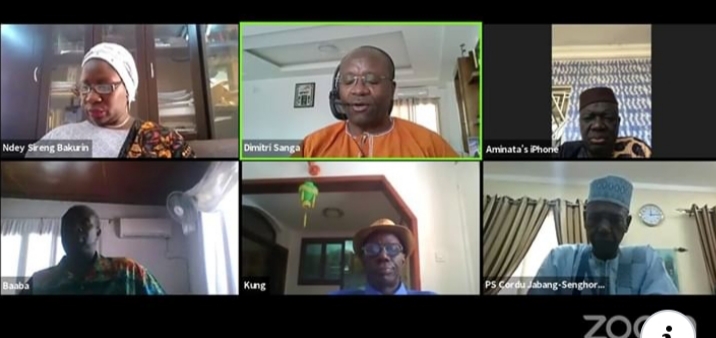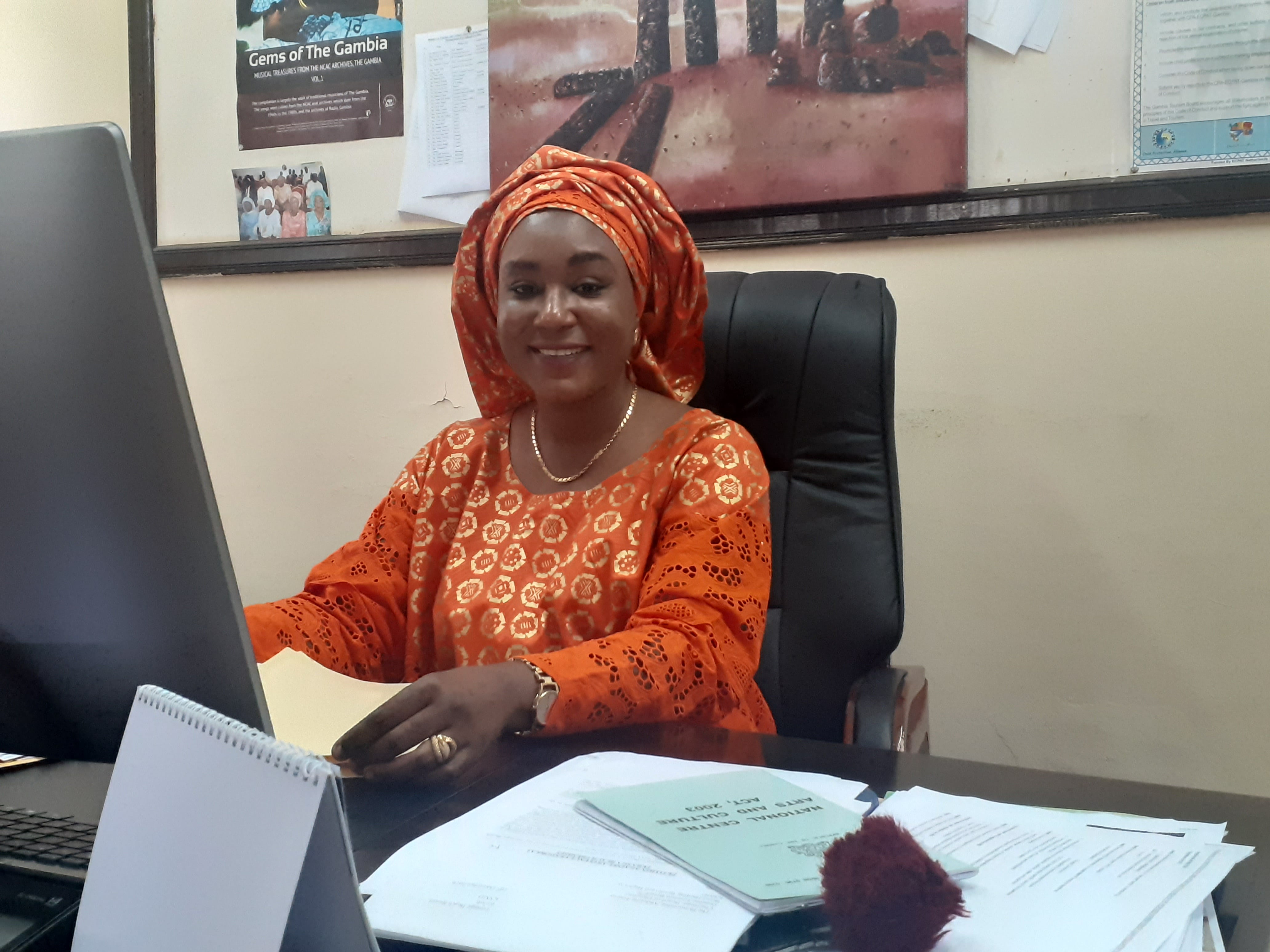Hon. Hamat N.K Bah, Minister of Tourism and Culture on Wednesday, 6th May 2020 launched the UNESCO Resiliart Teleconference Project. The online meeting was hosted by the Ministry of Tourism and Culture through the National Centre for Arts and Culture (NCAC) and fully supported by the UNESCO office in Dakar.
Resiliart is a UNESCO online effort to foster dialogue among Gambian artists, arts administrators and policy makers, and also UNESCO itself to assess and chart the way forward during and after Covid-19. The Gambia is the first country in Africa to do this online discussion.
The two-day teleconference availed the NCAC the opportunity to use UNESCO Resiliart platform to continue to create hope and resilience among artists through online discussion from the safety of their homes.
Minister Bah congratulates UNESCO for taking the lead to start putting plans in place to help artists and other cultural groups as to how to maneuver or to survive Covid-19 and after Covid-19 what needs to be done to help them.
He described culture as an instrument that they all need when they feel sad because it really can change their behaviors and attitudes in most cases. “I believe this has been a time when most people have used culture to at least feel a bit better,” he said.
According to him, they have seen great artists in the world performing to raise awareness and entertain people who have been locked in their houses for months. Indeed, he admitted that it has not been an easy time particularly for Africa and The Gambia for that matter.
However, he went on, The Gambia government has taken note of this and they will certainly support the cultural groups, writers, and others involved in the field of culture to sustain themselves and get back to business after Covid-19. “We believe that this forum will also avail us the opportunity to draw lessons that may also help to guide us in that process of trying to see how we can mitigate some of the challenges that the cultural industry is going through all over the world,” he said.
Minister Bah further stated that cultural tourism matters a lot to them and they know that cultural tourism has suffered immensely. Thus, he expressed hope that the debate will give them an opportunity to formulate policies that will advance the industry.
Cordu Linguere Jabang-Senghore, Permanent Secretary of the Ministry of Tourism and Culture disclosed that since the change in Government in 2017, the arts and culture sector has been on an upsurge. “All sectors of the arts-literature, fine arts, festivals, drama, film, dance, photography-have seen a big boost in terms of participation, and even investment in terms of printing shops, studios, record labels etc,” she said.
According to her, the rise in private broadcasting on TV, FM and other media has supported this; likewise, the legal framework such as the Copyright Act and Regulations which protect the artistic works of Gambians, which the Ministry promulgated in 2018. She said it is the youth who are now heavily involved in the creative sector as a conduit for self-employment. Therefore, she buttressed that this sector is critical to the national development paradigm of the National Development Plan 2018-2021.
She informed the meeting that the Ministry has had a smooth working relation with The Gambian Arts fraternity and players through its satellite body, the NCAC.
“Since 2018, the Ministry has doubled the operating budget for the NCAC to enable it hire more hands to implement its mandate as per the NCAC Act, 2003. Also, for the first time, the NCAC has benefitted from a Development Budget to take care of heritage sites and upgrade them to standard, including the UNESCO World Heritage sites under our purview. Sites associated with other UNESCO Conventions like the 2005 Convention and the 2003 Conventions such as the Kankurang Centre have been taken care of thanks to increase funding to NCAC,” PS Jabang-Senghore disclosed.
She highlighted that the increased funding to NCAC has also enabled them to support more cultural programming including community festivals, book publications, production of drama, and capacity building while citing the support of UNESCO Participation Programme, noting that in 2020 NCAC trained 24 young Gambian players in the creative sector in entrepreneurship in the arts.
“However, Covid-19 has put many of these achievements in check. But I wish to assure the art and culture players that we are stepping up efforts to ensure their suffering due to the pandemic is covered. I wish to believe that our sector will come out of the pandemic bruised but stronger,” she assured, while affirming that a National Fund for Culture is their priority.
The Director of the UNESCO Regional Office in Dakar, Mr. Dimitri Sanga, revealed that this platform is the first they at UNESCO launched in the sub-region. He, therefore, affirmed that in this moment of crisis, people need culture and the Covid-19 crisis is showing that they need artists, authors as well as cultural professionals more than ever. According to him, they carry the voice of resilience and participate in raising awareness in the fight against the pandemic. “Indeed, throughout the world, millions of people are physically separated from another, yet culture brings us together, it provide comfort, aspiration and hope in this time of uncertainty,” he said.
As the world work to address the immediate danger of Covid-19, he said, they also need to put in place measures to support artists and access to culture in the short and long term.
Mr. Sanga indicated that the debate, which brought together variety and range of stakeholders, public authorities and the civil society will help us more forward. He assured that at UNESCO, they will do all they can to support culture and empower artist and curators now and after this crisis. “We hope you will join us in this effort in supporting culture in your own community however you can,” he said.
On Wednesday, Minister Bah; Jaliba Kuyateh, musician and King of Kora; Sheikh Tijan Secka, film maker; Rohey Camara actress, Dr Cherno Omar Barry, writer, Hassoum Ceesay, Director General, NCAC front the online discussion.
On Thursday, Ndey Fatou Jabang, dancer; Baaba Silah, writer; Oko Drammeh, music promoter; Baboucarr Cham, cultural promoter and radio personality and manager; Lamin Jarju, UNESCO NATCOM were on the platform.
The head of the UNESCO Office for West and Central Africa based in Dakar, Senegal also joined the discussions online.
Both online meetings will enable Gambian artists’ voice to be heard on the impact of the pandemic on the arts, and will clear the way for a roadmap for an intervention to support the arts and culture sector by government and UNESCO and other partners as part of Covid-19 social response.


